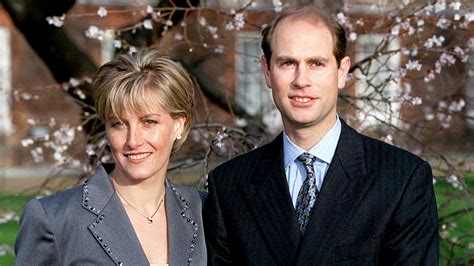
Prince Edward and Sophie, the Earl and Countess of Wessex, were reportedly offered the Dukedom of Cambridge upon their marriage in 1999, but declined the title, which was ultimately bestowed upon Prince William and Kate Middleton in 2011. Instead, Edward chose to be the Earl of Wessex, a decision influenced by his admiration for a character in the film “Shakespeare in Love.”
Edward and Sophie: The Cambridge That Wasn’t
The Duke and Duchess of Cambridge. The titles conjure images of Prince William and Kate Middleton, a royal couple beloved worldwide. However, a recent revelation has surfaced, indicating that these titles were initially intended for another royal pair: Prince Edward, the youngest son of Queen Elizabeth II, and his wife, Sophie, the Countess of Wessex.
According to royal sources, the Queen offered Edward and Sophie the Dukedom of Cambridge upon their marriage in 1999. However, the couple opted for the titles of Earl and Countess of Wessex, a decision that has sparked curiosity and discussion among royal watchers.
The reasoning behind this choice, as reported by royal experts, stems from Prince Edward’s personal preferences and a nod to royal history. It is believed that Edward was drawn to the Earldom of Wessex after watching the film “Shakespeare in Love,” where a character held the title of Earl of Wessex.
“He liked the sound of it and asked the Queen if he could have that instead,” a royal insider told The Telegraph in 2010. The Queen, respecting her son’s wishes, granted his request, making him the first royal to be created an Earl since the 19th century.
This decision meant that the Dukedom of Cambridge remained vacant until Prince William’s marriage to Kate Middleton in 2011, when the Queen bestowed the titles upon them. The move solidified William’s position as a future king and cemented Kate’s role as a prominent member of the royal family.
The decision to offer the Dukedom of Cambridge to Edward and Sophie raises questions about the royal family’s succession plans and the significance of royal titles. It also sheds light on the personalities and preferences of individual members of the royal family, highlighting the complex dynamics that shape their public image and private lives.
The Significance of Royal Titles
Royal titles are more than just honorary designations; they carry historical weight and symbolic meaning. They represent a member of the royal family’s connection to a specific geographic region and their commitment to serving the people of that area.
The title of Duke is one of the highest-ranking titles in the British peerage, traditionally reserved for members of the royal family. The title is hereditary and typically passes down through the male line. The Dukedom of Cambridge has a long and storied history, dating back to the 17th century.
The Earldom, while still a noble title, ranks below the Dukedom in the peerage system. The title is also hereditary but can be created for individuals outside the royal family in recognition of their service to the nation.
The Queen’s decision to offer Edward the Dukedom of Cambridge underscores the importance of this title within the royal family. It signifies her intention to recognize Edward and Sophie’s contributions to the monarchy and their potential to serve as prominent representatives of the Crown.
Prince Edward’s Choice: A Personal Decision
While the Dukedom of Cambridge would have undoubtedly elevated Edward and Sophie’s status within the royal family, their decision to opt for the Earldom of Wessex reflects their personal preferences and priorities.
Edward’s fascination with the title of Earl of Wessex suggests a desire to forge his own path and establish his unique identity within the royal family. It also highlights his interest in history and his appreciation for the symbolic significance of royal titles.
Sophie’s support for Edward’s decision underscores their strong partnership and their shared commitment to serving the Crown in their own way. As the Countess of Wessex, Sophie has become a respected and admired member of the royal family, known for her dedication to charitable work and her down-to-earth personality.
Their choice also demonstrates a modern approach to royal titles, suggesting that personal preferences and individual aspirations can play a role in shaping the future of the monarchy.
The Wessexes: A Working Royal Couple
Despite not holding the title of Duke and Duchess of Cambridge, Prince Edward and Sophie, Countess of Wessex, have carved out significant roles within the royal family. They are considered “working royals,” undertaking numerous public engagements and supporting a variety of charitable organizations.
The Earl of Wessex has focused his efforts on supporting the arts, particularly through his involvement with the National Youth Theatre. He also champions the Duke of Edinburgh’s Award, a program that empowers young people to develop their skills and achieve their potential.
The Countess of Wessex is a passionate advocate for women’s rights and gender equality. She has traveled extensively to raise awareness about issues such as sexual violence in conflict and the importance of education for girls. She also supports charities that focus on eye care and preventing blindness.
Together, Edward and Sophie have become valuable assets to the royal family, contributing to the monarchy’s continued relevance in the 21st century. They have demonstrated a commitment to public service and a dedication to making a positive impact on the lives of others.
The Duke and Duchess of Cambridge: A Legacy of Their Own
While Edward and Sophie may have been offered the Dukedom of Cambridge, Prince William and Kate Middleton have embraced the titles and made them their own. They have become global ambassadors for the United Kingdom, representing the country with grace and dignity on the world stage.
The Duke of Cambridge has focused his efforts on issues such as mental health, environmental conservation, and supporting veterans. He has launched several initiatives, including Heads Together, a campaign to raise awareness about mental health and reduce stigma.
The Duchess of Cambridge has become a style icon, known for her elegant and sophisticated fashion choices. She has also used her platform to promote the arts, support early childhood education, and advocate for the well-being of children and families.
Together, William and Kate have created a modern and relatable image for the monarchy, connecting with people from all walks of life. They have demonstrated a commitment to public service and a dedication to making a positive impact on the world.
The decision to ultimately bestow the Dukedom of Cambridge on William and Kate solidified their position as the future of the monarchy. It signaled the Queen’s confidence in their ability to carry on the legacy of the Crown and lead the royal family into the next generation.
The Enduring Appeal of the Royal Family
The story of Edward and Sophie and the Dukedom of Cambridge highlights the enduring appeal of the royal family and the fascination that surrounds their lives. The monarchy represents a connection to the past, a symbol of national identity, and a source of stability in a rapidly changing world.
The royal family’s ability to adapt to the times while maintaining their traditions and values is a testament to their resilience and their commitment to public service. They continue to play an important role in British society, inspiring and uniting people across the country.
The ongoing interest in their personal lives, their relationships, and their decisions reflects the public’s desire to connect with the royal family on a human level. The story of Edward and Sophie and the Dukedom of Cambridge offers a glimpse into the complexities of royal life and the choices that shape the destiny of the monarchy.
The Future of the Wessex Titles
With Prince Edward’s eventual inheritance of the Dukedom of Edinburgh, currently held by his brother, Prince Andrew, the Earldom of Wessex will eventually need a new holder. While there is no official announcement, it is speculated that the title could be bestowed upon Edward’s son, James, Viscount Severn, when he comes of age or upon his marriage. This would continue the tradition of royal titles being passed down through generations. However, the ultimate decision rests with the reigning monarch at the time.
The Wessex titles, though perhaps not as widely recognized as the Cambridge dukedom, represent a significant branch of the royal family. Edward and Sophie have diligently worked to enhance the prestige of these titles through their charitable work and public service. Their legacy will undoubtedly influence the future holders of these titles.
Modernization and Tradition
The royal family continually navigates the delicate balance between maintaining tradition and adapting to modern expectations. The choice made by Edward and Sophie to forgo the Dukedom of Cambridge in favor of the Wessex earldom can be seen as part of this ongoing evolution. It highlights a willingness to personalize their roles within the monarchy and prioritize their individual preferences.
This modernization also extends to how the royal family engages with the public. Through social media and other platforms, they are increasingly accessible and transparent, allowing for a more intimate connection with their followers. This shift is essential for maintaining the relevance of the monarchy in a world where traditional institutions are facing increasing scrutiny.
The royal family’s ability to adapt while preserving its core values will be crucial to its long-term success. The decisions made by current and future generations of royals will shape the future of the monarchy and its role in British society.
The Role of Media and Public Perception
The media plays a significant role in shaping public perception of the royal family. News articles, documentaries, and social media coverage all contribute to the narrative surrounding the monarchy. The story of Edward and Sophie and the Dukedom of Cambridge is just one example of how media attention can influence public opinion and spark discussions about royal titles and succession.
It is essential for the media to report on the royal family with accuracy and fairness, providing context and avoiding sensationalism. The public relies on the media to provide informed commentary and analysis, helping them to understand the complexities of the monarchy and its role in society.
The royal family also has a responsibility to manage its public image and engage with the media in a transparent and proactive manner. By communicating effectively and addressing public concerns, they can maintain trust and ensure that their message is accurately conveyed.
The relationship between the royal family and the media is a complex and ever-evolving one. It is crucial for both parties to understand and respect each other’s roles in order to maintain a healthy and productive dialogue.
Charitable Endeavors and Public Service
A significant aspect of the royal family’s role is their commitment to charitable endeavors and public service. Prince Edward and Sophie, Countess of Wessex, have dedicated their lives to supporting various causes and making a positive impact on the lives of others.
Their charitable work extends across a wide range of areas, including the arts, youth development, women’s rights, and eye care. They actively participate in fundraising events, raise awareness about important issues, and advocate for policies that benefit vulnerable populations.
The royal family’s charitable work not only benefits those in need but also enhances the monarchy’s reputation and strengthens its connection with the public. By demonstrating a genuine commitment to public service, they inspire others to get involved and make a difference in their communities.
The legacy of charitable work established by previous generations of royals, such as Queen Elizabeth II and Prince Philip, continues to inspire and motivate current and future members of the royal family. Their dedication to public service is an integral part of the monarchy’s identity and its ongoing relevance in the 21st century.
Frequently Asked Questions (FAQ)
1. Why were Prince Edward and Sophie offered the Dukedom of Cambridge?
The Queen reportedly offered the Dukedom of Cambridge to Prince Edward and Sophie upon their marriage in 1999 as a sign of recognition for their potential contributions to the monarchy and their ability to serve as prominent representatives of the Crown. It is a customary practice to bestow a dukedom on a royal upon marriage, signifying their elevated status within the royal family.
2. Why did Prince Edward choose the title Earl of Wessex instead?
According to reports, Prince Edward was drawn to the title of Earl of Wessex after watching the film “Shakespeare in Love,” where a character held the title. He reportedly liked the sound of it and requested it from the Queen, who granted his wish. This demonstrated a personal preference and a desire to forge his own path within the royal family. “He liked the sound of it and asked the Queen if he could have that instead,” a royal insider told The Telegraph in 2010.
3. What is the difference between a Dukedom and an Earldom?
A Dukedom is a higher-ranking title in the British peerage system than an Earldom. Dukes are typically members of the royal family, while Earls can be members of the royal family or individuals outside the royal family who have been recognized for their service to the nation. Both titles are hereditary.
4. Will Prince Edward’s son, James, Viscount Severn, inherit the Earldom of Wessex?
While there is no official confirmation, it is speculated that James, Viscount Severn, could inherit the Earldom of Wessex when Prince Edward eventually inherits the Dukedom of Edinburgh. This would continue the tradition of royal titles being passed down through generations. However, the ultimate decision rests with the reigning monarch at the time.
5. How have Prince Edward and Sophie contributed to the royal family as the Earl and Countess of Wessex?
Prince Edward and Sophie have become valuable assets to the royal family, contributing to the monarchy’s continued relevance. The Earl of Wessex has focused on supporting the arts and the Duke of Edinburgh’s Award, while the Countess of Wessex is a passionate advocate for women’s rights and supports charities that focus on eye care. Together, they undertake numerous public engagements and support a variety of charitable organizations, demonstrating a commitment to public service and a dedication to making a positive impact on the lives of others.









